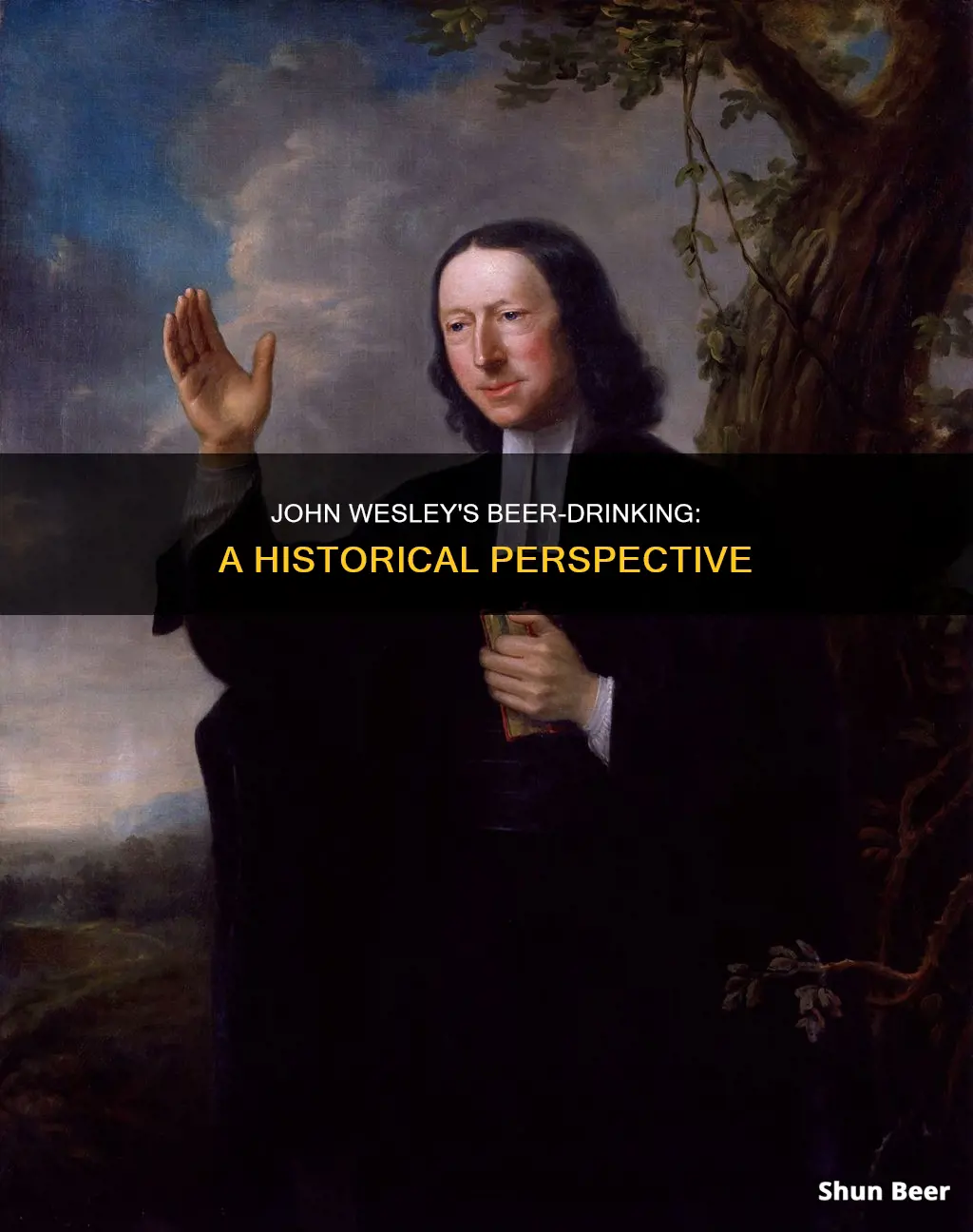
John Wesley, the English cleric, theologian, and leader of the Methodist movement, had a complicated relationship with alcohol. While he was a drinker of malt ale himself, Wesley despised the use of hops in brewing and warned against the dangers of alcohol abuse. In a famous sermon, The Use of Money, and in a letter to an alcoholic, Wesley cautioned against the harmful effects of alcohol, particularly hard liquors and spirits.
In the 18th century, beer was often safer to drink than water, which was often contaminated. Wesley's concerns about alcohol centred on excessive consumption and the social issues it caused, such as poverty and crime. He advised church members to taste no spirituous (distilled) liquor... unless prescribed by a physician.
Wesley also had a notable influence on Arthur Guinness, the brewer. Guinness was inspired by Wesley's teachings to use his wealth for the good of humankind, and he engaged in various reforming and evangelising efforts in Dublin.
| Characteristics | Values |
|---|---|
| Date of birth | 28 June 1703 |
| Date of death | 2 March 1791 |
| Profession | English cleric, theologian, and evangelist |
| Known for | Founder of Methodism |
| Views on hops | Opposed the use of hops in beer |
| Alcohol consumption | Drank "small beer", which is very low in alcohol content |
| Budweiser Beer Ad | Budweiser used a quote from Wesley to promote beer consumption |
| Temperance Movement | The Budweiser Beer Ad was challenged as inaccurate by religious groups |
What You'll Learn

John Wesley's opposition to the public opinion that hops were beneficial to good health
John Wesley, the English cleric, theologian, and leader of the Methodist movement, opposed the public opinion that hops were beneficial to good health. In a letter to the editor of the Bristol Gazette in 1789, Wesley expressed his disagreement with the contemporary view that hops were wholesome and promoted good health. He pointed out that Parliament, during the reign of King James I, had outlawed hops as a poisonous herb, and this act had never been repealed.
Wesley argued that the belief in the health benefits of hops was erroneous and that the use of hops had introduced a noxious quality to beer. He claimed that hops turned an excellent medicine, the unhopped decoction of malt, into poison. Wesley also refuted the common opinion that malt drink would not keep without the use of hops. He conducted an experiment where he brewed malt with and without hops and found that the ale without hops kept just as well as the one with hops.
Wesley's opposition to the use of hops was based on his concern for the health of his fellow Englishmen. He believed that the addition of hops to malt drink contributed to the breeding and increase of diseases such as gout, stone, and scurvy. He also argued that the tax revenue generated from hops may not be worth the loss of lives due to the harmful effects of hops.
Wesley's stance on hops was not without controversy, and he faced opposition from brewers, sellers, and even some physicians who affirmed the health benefits of hops. However, Wesley remained steadfast in his belief that hops were pernicious and worked to persuade people to save their money and preserve their health by avoiding hops.
Wesley's opposition to the public opinion on hops was part of his broader teachings on moderation and his concern for the well-being of society, especially the lower classes who were vulnerable to the harmful effects of alcohol abuse.
Beer and Gas: Is There a Link?
You may want to see also

Wesley's view that hops were a poisonous herb
John Wesley, the English cleric, theologian, and leader of the Methodist movement, had strong views on the use of hops in beer. In 1789, he penned several letters to the editor of the Bristol Gazette, expressing his opposition to the popular opinion that hops were beneficial to good health.
Wesley refuted the notion that hops were necessary for preserving malt drink, claiming that it was a "mere humbug upon the good people of England". He conducted his own experiments, brewing malt with and without hops, and found that the addition of hops did not improve preservation. He also questioned the idea that hops were necessary for raising public revenue through taxation, arguing that the potential negative impact on public health outweighed any financial benefits.
Wesley's letters to the Bristol Gazette sparked a debate about the use of hops, with some rebutting his claims. In his subsequent letters, Wesley clarified his position, stating that hops were pernicious, especially to those susceptible to certain health conditions. He based this assertion on his own experience and the opinions of physicians he had consulted.
In conclusion, John Wesley's view that hops were a poisonous herb was informed by historical precedent, his own experiments, and medical opinions of the time. He believed that the potential health risks of hops outweighed any perceived benefits, and his letters sparked a broader discussion about the role of hops in beer production.
Beer and Pre-Diabetes: What's the Verdict?
You may want to see also

Wesley's belief that hops were a noxious quality
John Wesley, the founder of Methodism, was a drinker of malt ale who despised the use of hops in brewing. In 1789, he penned several letters to the editor of the Bristol Gazette, expressing his opposition to public opinions in favour of the bitter herb, hops, as being beneficial to good health. Wesley pointed out that as far back as the reign of King James I, Parliament had outlawed hops as a poisonous herb, and that this act had never been repealed. He argued that over time, the ills of this poisonous weed were forgotten, and people began to believe that it promoted good health.
Wesley refuted the contemporary belief that malt drink would not keep without the use of hops. He conducted an experiment in London, brewing any quantity of malt, adding hops to one half and none to the other half. He kept them in the same cellar for three to six months, and the ale without hops kept just as well as the other. He wrote:
> "I have made the experiment at London. One barrel had no hops, the other had. Both were brewed with the same malt, and exactly in the same manner. And after six months that without hops had kept just as well as the other."
Wesley believed that hops introduced a "`noxious quality`" to the brew. He argued that hops were pernicious, especially to those susceptible to stone, gout, or scurvy. He wrote about his own experience:
> "I do not apprehend that we need recur either to 'the Elements of Chemistry' or to the College of Physicians on the head. I urge a plain matter of fact – 'that hops are pernicious.' I did not say to all (though perhaps they may more or less) but to those that are inclined to stone, gout, or scurvy. So I judge because I feel it to myself if I drink it two or three days together; and because so I hear from many skillful physicians; and I read in their works."
Wesley's views on hops were influenced by his experiences during his early ministry years in Savannah, Georgia. During this time, he fell in love with a young woman named Sophia Hopkey, and he hesitated to marry her because he felt that his priority was to be a missionary to the Native Americans. After Sophia married another man, Wesley believed that her former zeal for practising the Christian faith declined. As a result, he denied her Communion, and legal proceedings against him ensued, leading him to flee back to England in 1737.
Wesley's experiences in Georgia may have contributed to his negative view of hops and alcohol. He may have associated hops with the social and personal ills that he observed during his time in Savannah.
Morphsuits and Beer: A Perfect Pair?
You may want to see also

The use of Wesley's image in a Budweiser Beer ad
John Wesley, the founder of the Methodist religion, was featured in a Budweiser Beer advertisement that ran nationally during the summer of 1908. The ad portrayed Wesley as an advocate of beer drinking, quoting him as saying, "Without bread and wine, the strongest bodies decay... bread and wine keep up our natural life." It also cited his criticism of a book by Dr. Cadogan, in which Wesley is said to have praised the use of fermented liquor as "one of the noblest cordials of nature." Additionally, the ad referenced Wesley's pamphlet 'Primitive Physic,' where he advised his followers to "Drink water only when it agrees with your stomach; if not, good small beer."
The ad was likely an attempt by Budweiser to battle the growing American Temperance Movement, which sought to end the sale of liquor, beer, and wine in the United States. However, the ad was quickly challenged as inaccurate by the religious paper, The Western Christian Advocate, which argued that the quotes were falsehoods or misrepresentations.
While Wesley was not a teetotaler, he did strongly oppose "spirituous liquors" with high alcohol content. He drank some "small beer," which had a low alcohol content and was safer than some water sources at the time. Wesley also wrote letters to the editor of the Bristol Gazette, expressing his opposition to the use of hops, which were used to turn ale into beer. He argued that hops were a poisonous herb that turned an excellent medicine into poison and were not necessary for preserving drink.
Beer: Kidney Stone Remedy or Myth?
You may want to see also

Wesley's preference for small beer
John Wesley, the founder of Methodism, was a drinker of malt ale who despised the use of hops in brewing. In 1789, Wesley penned several letters to the editor of the Bristol Gazette, expressing his opposition to the public opinion in favour of hops as being beneficial to good health.
Wesley pointed to the fact that as far back as the reign of King James I, Parliament had outlawed hops as a poisonous herb. He argued that over time, the dangers of this poisonous weed were forgotten, and people began to believe that it promoted good health. He also refuted the idea that malt drink would not keep without the use of hops.
Wesley lived during a time when water was often contaminated, and beer was generally safer to drink. However, he recognised the dangers of alcohol abuse and warned against it in his famous sermon, "The Use of Money", and in his letter to an alcoholic. His teachings on alcohol use largely concerned ""hard liquors and spirits" rather than the low-alcohol beer, which was often safer to drink than water.
Wesley's influence extended beyond his own drinking preferences, as he is credited with influencing Arthur Guinness, the brewer of Guinness beer, to devote much of his wealth to charity.
Beer on American Airlines: What's Allowed and What's Not
You may want to see also
Frequently asked questions
Yes, John Wesley drank beer. He was a drinker of malt ale and despised the use of hops in brewing.
No, John Wesley did not like hops. He believed hops were a poisonous herb and harmful to health.
Yes, John Wesley influenced Arthur Guinness, the brewer. Wesley taught, "Earn all you can. Save all you can. Give all you can." This inspired Guinness to use his wealth for the good of humankind.
No, John Wesley advised church members to "taste no spirituous (distilled) liquor... unless prescribed by a physician."
It is likely that Wesley drank very little water. In his time, water was often contaminated, and beer was considered safer to drink.







